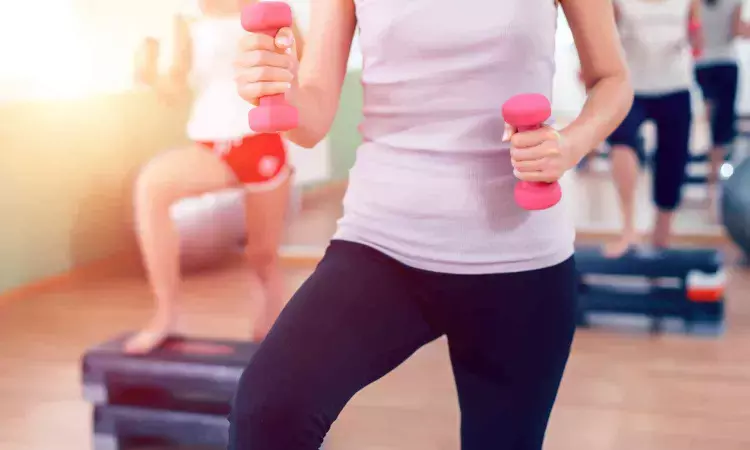- Home
- Medical news & Guidelines
- Anesthesiology
- Cardiology and CTVS
- Critical Care
- Dentistry
- Dermatology
- Diabetes and Endocrinology
- ENT
- Gastroenterology
- Medicine
- Nephrology
- Neurology
- Obstretics-Gynaecology
- Oncology
- Ophthalmology
- Orthopaedics
- Pediatrics-Neonatology
- Psychiatry
- Pulmonology
- Radiology
- Surgery
- Urology
- Laboratory Medicine
- Diet
- Nursing
- Paramedical
- Physiotherapy
- Health news
- Fact Check
- Bone Health Fact Check
- Brain Health Fact Check
- Cancer Related Fact Check
- Child Care Fact Check
- Dental and oral health fact check
- Diabetes and metabolic health fact check
- Diet and Nutrition Fact Check
- Eye and ENT Care Fact Check
- Fitness fact check
- Gut health fact check
- Heart health fact check
- Kidney health fact check
- Medical education fact check
- Men's health fact check
- Respiratory fact check
- Skin and hair care fact check
- Vaccine and Immunization fact check
- Women's health fact check
- AYUSH
- State News
- Andaman and Nicobar Islands
- Andhra Pradesh
- Arunachal Pradesh
- Assam
- Bihar
- Chandigarh
- Chattisgarh
- Dadra and Nagar Haveli
- Daman and Diu
- Delhi
- Goa
- Gujarat
- Haryana
- Himachal Pradesh
- Jammu & Kashmir
- Jharkhand
- Karnataka
- Kerala
- Ladakh
- Lakshadweep
- Madhya Pradesh
- Maharashtra
- Manipur
- Meghalaya
- Mizoram
- Nagaland
- Odisha
- Puducherry
- Punjab
- Rajasthan
- Sikkim
- Tamil Nadu
- Telangana
- Tripura
- Uttar Pradesh
- Uttrakhand
- West Bengal
- Medical Education
- Industry
Vitamin C supplementation may reduce oxidative stress and inflammation in women during high-intensity exercise: Study

The benefits of taking extra Ascorbic Acid (AA) while exercising are not well known.
This study aims to investigate the effects of AA supplementation on oxidative stress, immune response, and inflammation in healthy women after a single session of high-intensity exercise.
In a crossover design, 20 sedentary women (aged 18-22) participated in 30 minutes of vigorous cycling. They were split into two groups: one group received a daily supplement of 1,000 mg of ascorbic acid (1,000AA), while the other group did not receive any supplementation (0AA). This regimen was followed for one week. Blood samples were taken before exercise, immediately after exercise, and 24 hours after exercise to analyze oxidative stress, inflammatory markers, CD4+ and CD8+ lymphocytes, and neutrophil phagocytic activity.
The AA supplement significantly increased plasma AA levels (p<0.05) and reduced post-exercise plasma MDA levels (p<0.05) but did not affect creatine kinase activity. White blood cells, CD8+ T cells, and IL-6 levels significantly increased after exercise but did not change in the 1,000AA group compared to the 0AA group. The neutrophil count increased (p<0.05) after exercise with no change in phagocytic function, although there was a slight drop in phagocytic function 24 hours after exercise in the 1,000AA group. Exercise and AA supplements had no effect on CD4+ T cells.
A single session of high-intensity exercise caused oxidative stress, muscle injury, inflammation, and a temporary increase in CD8+ T cells. Short-term AA supplementation reduced exercise-induced oxidative stress and inflammation by limiting the increase in IL-6 and CD8+ T cells.
Reference:
Piyawan Bunpo, Open Modal Vissuta Sirirungsee and Arissara Puangin, Ascorbic Acid Supplementation and Immune Response in Healthy Women during High-intensity Exercise, The Open Sports Sciences Journal, DOI: 10.2174/011875399X302175240427094350.
Dr Kamal Kant Kohli-MBBS, DTCD- a chest specialist with more than 30 years of practice and a flair for writing clinical articles, Dr Kamal Kant Kohli joined Medical Dialogues as a Chief Editor of Medical News. Besides writing articles, as an editor, he proofreads and verifies all the medical content published on Medical Dialogues including those coming from journals, studies,medical conferences,guidelines etc. Email: drkohli@medicaldialogues.in. Contact no. 011-43720751


